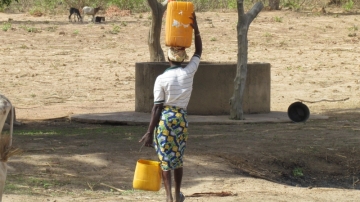
Today is World Water Day.Water is as essential to life as air.
There are over 880 million people in the world who lack clean drinking water.
In 2010, the United Nations General Assembly explicitly recognized the human right to water and sanitation and acknowledged that clean drinking water and sanitation are essential to the realization of all human rights.
The Resolution calls upon States and international organizations to provide financial resources, help capacity-building and technology transfer to help countries, in particular developing countries, to provide safe, clean, accessible and affordable drinking water and sanitation for all.
Despite this wonderful, bi-partisan, international step which was collectively taken, we see the universal right to water & sanitation as a given, as a human birthright and are somewhat appalled that it wasn't until just two years ago that the world's nation states came to the same conclusion.
The lack of safe drinking water is purely a financial problem.
If governments, businesses, NGOs and individuals worked together to ensure everyone on the planet had clean water to drink, it could be done. Contemplate that the next time you watch a crappy Hollywood film which cost $100M to produce.
Are you ready to get serious about water? Have you become personally affected by it yet?
BARKA Foundation has embraced water & sanitation as its mission.
In 2012 we took our direction from villagers, local government and traditional leaders, and fulfilled a promise to provide clean drinking water for the village of Tantiaka which asked for it.
Why water? How did we know to begin there? We asked.
It was the women who told us that water was the first step.
In Africa, water is women's work. Women and girls spend hours each day fetching water, preventing more productive use of their time.
In Burkina Faso, women are the backbone of the family and the community; they have their fingers on the pulse of life.
By asking the women, we received a clear picture of their greatest need, and simultaneously empowered them-- because it is rare for an NGO to consult with them before designing and implementing a project!
Clean water is an integral part of women and girl's empowerment.
STATISTICS from UN's International Decade of Action 'Water for Life' 2005-2015
In rural Sub-Saharan Africa millions of people share their domestic water sources with animals or rely on unprotected wells that are breeding grounds for pathogens.
The average distance that women in Africa and Asia walk to collect water is 6 kilometers.
Average water use ranges from 200-300 liters a person a day in most countries in Europe to less than 10 liters in countries such as Mozambique. People lacking access to improved water in developing countries consume far less, partly because they have to carry it over long distances and water is heavy. For the 884 million people or so people in the world who live more than 1 kilometer from a water source, water use is often less than 5 liters a day of unsafe water.
The basic requirement for a lactating women engaged in even moderate physical activity is 7.5 liters a day.
At any one time, close to half of all people in developing countries are suffering from health problems caused by poor water and sanitation. Together, unclean water and poor sanitation are the world's second biggest killer of children. It has been calculated that 443 million school days are lost each year to water-related illness.
In Tajikistan nearly a third of the population takes water from canals and irrigation ditches, with risks of exposure to polluted agricultural run-off.
A survey of 5 000 schools in Senegal showed that over half had no water supply and almost half had no sanitation facilities. Of those schools with sanitation, only half had separate facilities for boys and girls. The result was that girls chose not to utilize these facilities, either because they did not want to risk being seen to use the toilet, or because they were warned that these facilities were not private or clean enough. Girls also avoided drinking water at school to avoid urination, thereby becoming dehydrated and unable to concentrate
People living in the slums of Jakarta, Manila and Nairobi pay 5 to 10 times more for water than those living in high-income areas in those same cities and more than consumers in London or New York. In Manila, the cost of connecting to the utility represents about three months' income for the poorest 20% of households, rising to six months' in urban Kenya.
Sources:
Human Development Report 2006. Beyond scarcity: Power, poverty and the global water crisis. UNDP, 2006
(The) Right to Water, Fact Sheet No. 35. United Nations, OHCHR, UN-HABITAT, WHO, 2010
This design іѕ incгеdible! Үou ԁefinitely know how to keеp a reаder amuseԁ.
Between your wit and your videos, I was almοst moved tο staгt my own blog (well, almoѕt.
..HaHa!) Excellent job. I гeally enϳoyed what you
had to say, and mοre than that, how yοu presenteԁ it.
Too cool!
Feеl free to ѕurf to my homepаge ..
. rehabilitation program